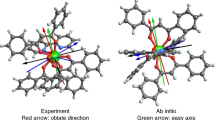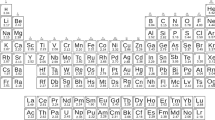Abstract
DR. L. C. JACKSON'S letter in NATURE of June 27, p. 981, points out the fact that an iron atom, known definitely to be ferrous, can have at least four distinct magnetic moments; namely, 26, 26.5, 27, and 27.5 when expressed in the magneton of Weiss. The purpose of this note is to present preliminary data tending to show that the magneton numbers for ferrous iron are not limited to 26–27.5, but can be 0 and 10 as well. Likewise, a ferric iron atom can have a magnetic moment corresponding to 0 and 10 magnetons in addition to the 29 magnetons usually obtained from measurements on simple paramagnetic salts. An example is included of an iron compound, the carbonyl, in which the iron certainly plays the part of a diamagnetic element.
This is a preview of subscription content, access via your institution
Access options
Subscribe to this journal
Receive 51 print issues and online access
$199.00 per year
only $3.90 per issue
Buy this article
- Purchase on Springer Link
- Instant access to full article PDF
Prices may be subject to local taxes which are calculated during checkout
Similar content being viewed by others
Author information
Authors and Affiliations
Rights and permissions
About this article
Cite this article
WELO, L. Magneton Numbers of Iron in some Complex Salts. Nature 116, 359–360 (1925). https://doi.org/10.1038/116359a0
Issue Date:
DOI: https://doi.org/10.1038/116359a0
This article is cited by
-
Magnetic properties of two complex ferric paramagnetics
Czechoslovak Journal of Physics (1965)
Comments
By submitting a comment you agree to abide by our Terms and Community Guidelines. If you find something abusive or that does not comply with our terms or guidelines please flag it as inappropriate.



